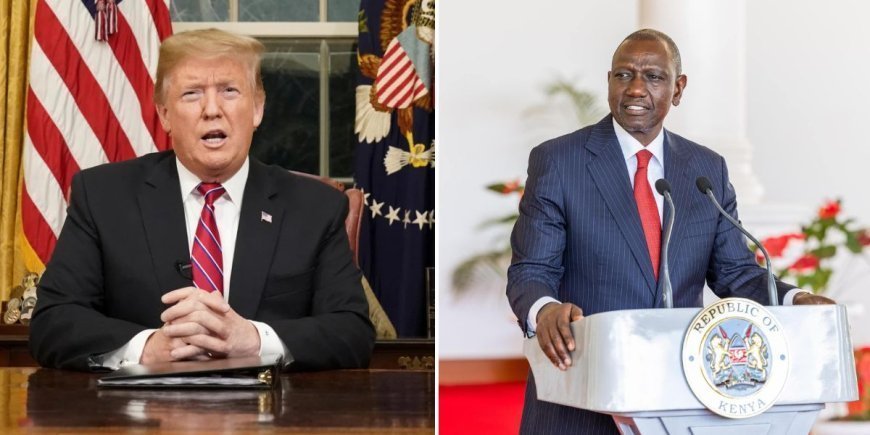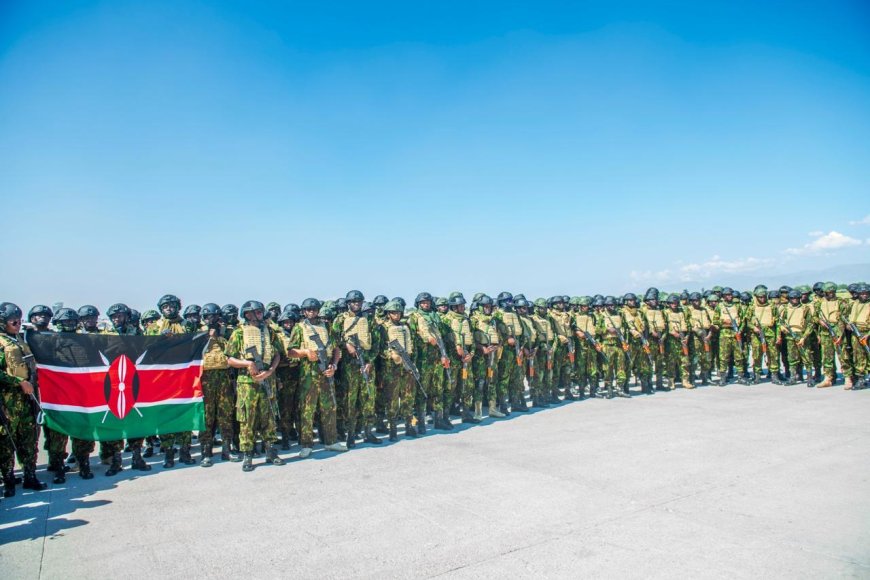Kenya's Non-NATO Ally Status Under Threat After Move By US Govt
Kenya was granted the status following President William Ruto’s official visit to Washington in May 2024, with the designation formalised on June 24, 2024.

The administration of United States (US) President Donald Trump has moved to reconsider Kenya’s recently acquired non-North Atlantic Treaty Organisation (NATO) ally status, just months after the country became the first in sub-Saharan Africa to receive the designation.
Kenya was granted the status following President William Ruto’s official visit to Washington in May 2024, with the designation formalised on June 24, 2024. The move was seen as a major step in strengthening U.S.-Kenya relations, especially in defence, security, and economic cooperation.
However, the status now faces uncertainty after U.S. Senator James Risch introduced a proposed amendment to the National Defence Authorisation Act for the 2026 fiscal year, calling for a review of Kenya’s designation within 90 days.
The review will primarily examine Kenya’s foreign and diplomatic stance, including how closely it aligns with U.S. interests and its interactions with countries like China, Russia, and Iran. It will also evaluate any potential agreements or political and financial connections Kenya may have with armed groups, including al-Shabaab and the Rapid Support Forces (RSF).

The fourth contingent of Kenyan police officers arriving at the Toussaint Louverture International Airport (TLIA) in Haiti on February 6, 2025. /MSS
"A detailed description of the military and security relationship of the Government of Kenya with the People's Republic of China, the Russian Federation, and Iran, including any engagements, agreements, or joint activities since June 24, 2024," read part of an excerpt from the US Congress website.
"A detailed description of the political and financial links of key political actors and institutions of Kenya with the People's Republic of China, the Russian Federation, and Iran."
The review will also investigate whether President Ruto’s administration has used U.S. security and intelligence assistance to carry out human rights abuses, including abductions, torture, renditions, or acts of violence against civilians.
If the amendment passes, Secretary of State Marco Rubio would be mandated to lead the review and present a report to the relevant Congressional Committees within 180 days. This proposed legislation signals a major shift in the direction of U.S.-Kenya relations.
What This Means
The U.S. review of Kenya’s non-NATO ally status is a significant development that could have serious consequences for Kenya’s international standing and strategic partnerships.
Risk of Losing Key Strategic Status
Kenya’s designation as a non-NATO ally grants it preferential access to U.S. military assistance, defence training, intelligence sharing, and potentially advanced military technology. It marked a major diplomatic milestone when granted in June 2024.
However, if the review results in a revocation or downgrade of this status, Kenya risks losing these critical benefits, which could weaken its security capabilities and limit its influence in regional and global affairs.
Diplomatic Trust Under Scrutiny
The review reflects growing U.S. concerns about Kenya’s foreign policy direction. It will assess whether Kenya is maintaining a strong alignment with U.S. interests or drifting closer to geopolitical rivals such as China, Russia, and Iran.
It will also examine potential political and financial ties between Kenyan officials or institutions and these countries. This signals a shift in Washington’s perception of Nairobi and suggests that trust between the two nations is being reevaluated.
Human Rights Spotlight
Another focus of the review is whether the Kenyan government has misused U.S. security and intelligence support for human rights violations. Allegations of abductions, torture, renditions, and civilian abuse will be taken seriously.
If the review uncovers credible evidence of such actions, it could trigger diplomatic backlash, lead to the suspension of aid, or result in targeted sanctions, damaging Kenya’s international reputation.
Geopolitical Pressure
This review also places Kenya in a tough spot geopolitically. As global tensions rise between the West and powers like China and Russia, Kenya is caught in the middle.

President William Ruto with President Xi Jinping in China on April 24, 2025. /PCS
The U.S. is demanding clarity on where Kenya stands. This increases pressure on President Ruto’s administration to make strategic choices that could affect not just bilateral relations with Washington but also partnerships with other global powers.
Potential for a Reset or Fallout
Ultimately, the outcome of this review could go one of two ways. If Kenya is able to address U.S. concerns and demonstrate a commitment to transparency and alignment, it could preserve or even deepen its strategic relationship with the United States.
On the flip side, if the findings are unfavourable, Kenya may face a rollback of its non-NATO ally status, damaging its defence ties with the U.S. and leading to broader diplomatic fallout.
Already, the developments attracted the attention of former Deputy President Rigathi Gachagua, who cautioned that Kenya could face international isolation for allegedly sheltering individuals and entities sanctioned by the U.S., some of whom are believed to have ties to extremist groups.
He criticised the government for allowing Kenya to become a financial haven for people listed by the U.S. Office of Foreign Assets Control (OFAC). He condemned the decision to host meetings with Sudan’s rebel Rapid Support Forces (RSF) earlier this year.
“We warned you about Sudan's Rapid Support Forces and Al-Shabaab. We asked you to keep international criminals and foreign terrorist organisations out of Kenya,” Gachagua said in a statement on his Facebook page.






